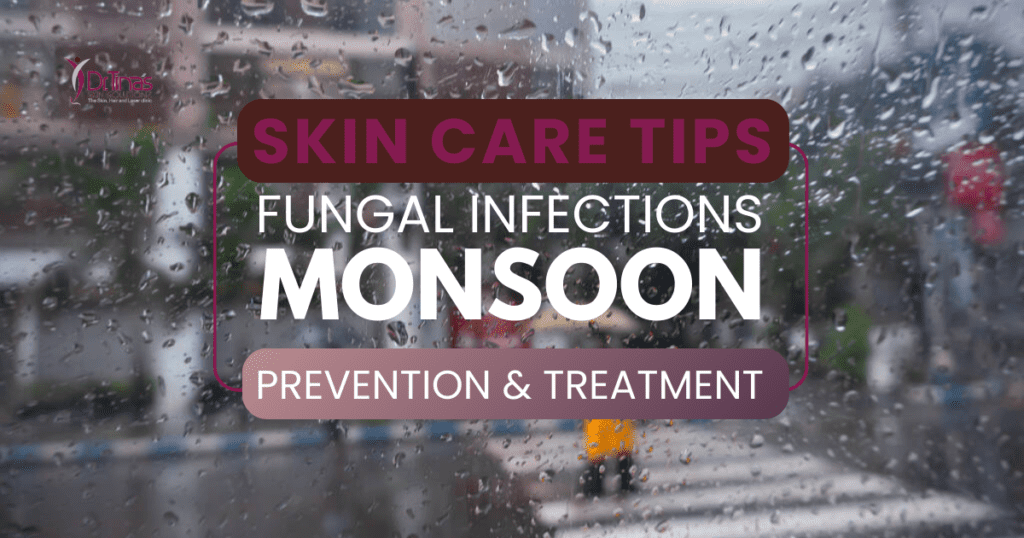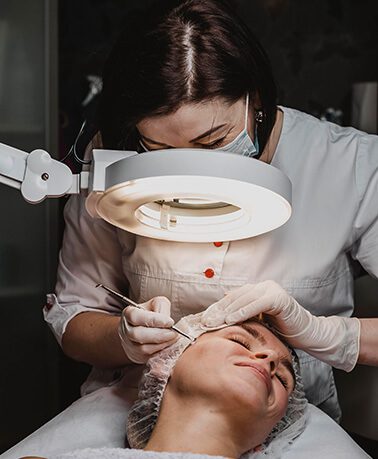Prevention and Treatment of Fungal Infections During the Monsoon

The monsoon season brings much-needed relief from the scorching heat, but it also comes with its own set of health challenges. One of the most common issues people face during this time is fungal infections. The increased humidity and dampness create an ideal environment for fungi to thrive, leading to various skin problems. Fungal infections can affect anyone, but you can protect yourself with the right knowledge and preventive measures. In this blog, we will discuss the causes, prevention, and treatment of fungal infections during the monsoon, with insights from Dr. Tina’s Skin Solutionz, a renowned skin care clinic in Bangalore.
Understanding Fungal Infections
Fungal infections are caused by an overgrowth of fungi, which are microorganisms that live in the environment. During the monsoon, the high levels of moisture in the air and on the skin create a perfect breeding ground for these fungi. Common types of fungal infections include:
- Athlete’s Foot: Affects the feet, especially between the toes.
- Ringworm: Appears as a red, circular rash on the skin.
- Yeast Infections: Often occur in moist areas like the groin, underarms, and under the breasts.
- Nail Fungal Infections: Affect the nails, making them thick and discolored.
These infections are not only uncomfortable but can also lead to more serious skin issues if not treated promptly.
How to Prevent Fungal Infections During the Monsoon
Prevention is always better than cure, especially when it comes to fungal infections. Here are some effective ways to keep these infections at bay during the monsoon:
- Keep Your Skin Dry: The most important preventive measure is to keep your skin as dry as possible. After bathing or getting wet in the rain, make sure to dry off thoroughly, especially in areas prone to moisture accumulation, such as between the toes, underarms, and groin.
- Wear Loose, Breathable Clothing: Opt for loose-fitting clothes made of breathable fabrics like cotton. Tight, synthetic clothing can trap moisture, making it easier for fungi to grow.
- Use Antifungal Powder: Antifungal powders can be very effective in preventing fungal infections. Apply it to areas that are more susceptible to sweating, like the feet and underarms. This will help keep the skin dry and reduce the chances of infection.
- Avoid Sharing Personal Items: Fungal infections are contagious, so avoid sharing personal items like towels, socks, and footwear. If you have a fungal infection, make sure to wash your clothes and towels separately.
- Maintain Good Hygiene: Take regular baths, and ensure you wash your hands and feet thoroughly after coming in from outside. Good hygiene is essential to prevent the spread of fungi.
- Wear Open-toed Footwear: During the monsoon, it’s best to wear open-toed footwear like sandals that allow your feet to breathe and stay dry. Avoid wearing wet shoes or socks for extended periods, as this can create a perfect environment for fungi to thrive.
By following these preventive measures, you can significantly reduce the risk of fungal infections during the monsoon. However, if an infection does occur, it’s important to seek professional treatment. At Dr. Tina’s Skin Solutionz, our expert care ensures that your skin remains healthy and free from fungal infections.
Treatment for Fungal Infections
Despite taking preventive measures, fungal infections can still occur. If you suspect you have a fungal infection, it’s important to seek treatment promptly to avoid complications. Here are some best treatments for fungal infections:
- Topical Antifungal Creams and Ointments: Topical treatments are usually the first line of defense against fungal infections. These creams and ointments are applied directly to the affected area to help kill the fungi and prevent the infection from spreading. Common antifungal agents include clotrimazole, miconazole, and terbinafine.
- Oral Antifungal Medications: For more severe infections or infections that do not respond to topical treatments, oral antifungal medications may be prescribed. These medications work from within the body to target the infection. Commonly prescribed oral antifungals include fluconazole and itraconazole.
- Antifungal Shampoos: For fungal infections of the scalp, antifungal shampoos containing ketoconazole or selenium sulfide can be effective. These shampoos should be used regularly until the infection clears up.
- Laser Treatment: In cases of stubborn nail fungal infections, laser treatment may be recommended. The laser targets the fungi under the nail, killing it without damaging the surrounding tissue. This treatment is safe, painless, and effective, with minimal side effects.
- Home Remedies: While medical treatment is often necessary, some home remedies can help manage symptoms and support the healing process. These include applying tea tree oil, garlic paste, or apple cider vinegar to the affected area. However, it’s important to consult a skin specialist before trying any home remedies, especially if you have a severe infection.
Prompt treatment and proper care are crucial in managing fungal infections, especially during the monsoon season. By following medical advice and incorporating preventive measures, you can effectively combat these infections and maintain healthy skin throughout the year.
Monsoon Fungal Infection Remedies
During the monsoon, it’s common for people to seek quick remedies for fungal infections. Here are a few tips and natural remedies that can help:
- Aloe Vera Gel: Aloe vera has antifungal and soothing properties. Applying aloe vera gel to the affected area can reduce itching and inflammation.
- Neem: Neem leaves have potent antifungal properties. Boil neem leaves in water and use this water to wash the affected areas to alleviate symptoms.
- Turmeric: Known for its antimicrobial properties, turmeric can be applied as a paste to the infected area to help fight the infection.
While these remedies can provide relief, they should not replace professional medical treatment, especially for persistent or severe infections.
How to Prevent Future Fungal Infections
Once you’ve treated a fungal infection, it’s important to take steps to prevent it from returning. Continue following the preventive measures mentioned earlier, and be especially vigilant during the monsoon season. Regularly inspect your skin for any signs of infection, and treat any minor infections promptly before they become more serious.
Trust Dr. Tina’s Skin Solutionz for Fungal Infection Treatment
Fungal infections can be a recurring problem during the monsoon, but with the right preventive measures and timely treatment, you can keep your skin healthy and infection-free. If you’re struggling with a fungal infection, it’s essential to consult a specialist to get the right treatment.
At Dr. Tina’s Skin Solutionz, we offer comprehensive treatment options for fungal infections, tailored to your specific needs. Our experienced team of skin specialists in Bangalore uses the latest techniques and treatments to ensure effective and long-lasting results. Whether you need topical or oral antifungals, laser treatment, or expert advice on preventing future infections, Dr. Tina’s Skin Solutionz is here to help. Don’t let fungal infections dampen your monsoon—schedule a consultation today and take the first step towards healthier, clearer skin.

Dr.Tina Ramachander is one of the best dermatologist in Bangalore and Medical Director at Dr.Tina’s Skin Solutionz, a skin care clinic in Bangalore. She completed her master’s in dermatology from the well acclaimed JJM Medical college in Karnataka and is now a practicising dermatosurgeon and Medical Cosmetologist in Bangalore.

